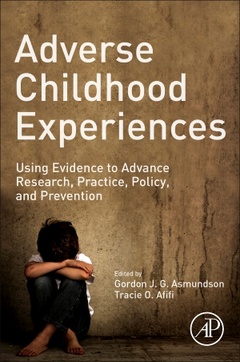Description
Adverse Childhood Experiences
Using Evidence to Advance Research, Practice, Policy, and Prevention
Authors: Asmundson Gordon J. G., Afifi Tracie O.
Language: English
Subjects for Adverse Childhood Experiences:
Approximative price 122.46 €
In Print (Delivery period: 14 days).
Add to cart384 p. · 15x22.8 cm · Paperback
Description
/li>Contents
/li>Biography
/li>Comment
/li>
Adverse Childhood Experiences: Using Evidence to Advance Research, Practice, Policy, and Prevention defines ACEs, provides a summary of the past 20 years of ACEs research, as well as provides guidance for the future directions for the field. It includes a review of the original ACEs Study, definitions of ACEs, and how ACEs are typically assessed. Other content includes a review of how ACEs are related to mental and physical health outcome, the neurodevelopmental mechanisms linking ACEs to psychopathology, sexual violence and sexual health outcomes, and violence across the lifespan. Important and contemporary issues in the field, like reconsidering how ACEs should be defined and assessed, the appropriateness of routine ACEs screening, thinking about ACEs from a public health and global perspective, strategies for preventing ACEs, understanding ACEs and trauma-informed care and resilience, and the importance of safe stable and nurturing environments for children are discussed. Adverse Childhood Experiences is a useful evidence-based resource for professionals working with children and families, including physicians, nurses, social workers, psychologists, lawyers, judges, as well as public health leaders, policy makers, and government delegates.
1. Twenty years and counting; The past, present, and future of ACEs research 2. ACEs: Definitions, measurement, and prevalence 3. Considerations for Expanding the Definition of ACEs 4. ACEs and mental health outcomes 5. ACEs and physical health outcomes 6. ACEs, sexual violence, and sexual health 7. ACEs and Violence in Adulthood 8. Routine Screening of ACEs: Should We or Shouldn’t We? 9. Methodological considerations in ACEs research 10. The Public Health Issue of Adverse Childhood Experiences in Canada 11. A Global Perspective on ACEs 12. Effective Prevention of ACEs 13. Neurodevelopmental Mechanisms linking ACEs with Psychopathology 14. ACEs and Resilience: Methodological and conceptual issues 15. ACEs and Trauma-Informed Care 16. Safe, Stable, and Nurturing Environments for Children 17. Current Knowledge and Future Directions for the ACEs Field
- Reviews the past 20 years of ACEs research
- Examines ACEs and mental and physical health
- Discusses the neurodevelopment mechanisms of ACEs and psychopathology
- Examines ACEs and violence across the lifespan
- Reconsiders the definition and assessment of ACEs
- Examines the issue of routine ACEs screening
- Discusses ACEs from a public health and global perspective
- Summarizes effective ACEs prevention, trauma-informed care, and resilience
- Provides recommendations for the future directions of the ACEs field




